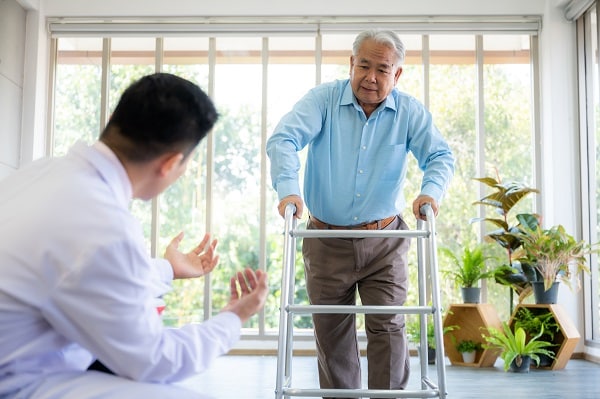It shouldn’t come as a surprise that people are more susceptible to different health risks as they age. As unfortunate as it is, your risk of developing certain conditions and diseases increases substantially as the years go by. That is why the older you get, the more you need to start paying attention! This article will discuss some of the seniors’ most common health risks to help you better understand them. It will also provide tips on reducing your risk of developing these illnesses.
Contents
Monitoring Your Health As A Senior
When you become a senior, it becomes increasingly important to monitor your health and take steps to prevent disease. However, many seniors are reluctant to see a doctor or take medication. There are several reasons for this:
- Seniors may not have medical procedures experience and may fear the unknown.
- They may not want to take medication that could have side effects.
- They may not want to admit that they are getting older and need help.
Regardless of the reasons, seniors must overcome their fears and take control of their health. By monitoring their health, seniors can catch problems early and take steps to prevent serious illnesses. In addition, by staying active and engaged in their care, seniors can maintain their independence and quality of life. So don’t wait until it’s too late – start monitoring your health today.
Heart Disease

Heart disease is one of the most common health risks for seniors. According to the Centers for Disease Control and Prevention (CDC), One person dies every 34 seconds in the United States from cardiovascular disease. The most common form of heart disease is coronary artery disease, when the arteries that supply blood to the heart become blocked or narrowed, leading to a heart attack, chest pain, or other serious health problems. Other types of heart disease include heart failure, irregular heartbeat, and valve problems. Seniors are at increased risk for developing heart disease because of age-related changes in the heart and arteries and other factors such as diabetes, high blood pressure, and high cholesterol. However, there are steps that seniors can take to reduce their risk of developing heart disease. These include maintaining a healthy weight, exercising regularly, eating a healthy diet, and not smoking. By taking these steps, seniors can help to keep their hearts healthy and reduce their risk of developing heart disease.
Cancer

Cancer is one of the leading health risks for seniors. As people age, their risk of developing cancer increases. There are many reasons for this:
- The cells in your body age along with you, and as they age, they become more susceptible to DNA damage that can lead to cancer.
- Your immune systems weaken as you age, making it harder for your body to fight off cancer cells.
- Seniors are more likely to have chronic health conditions that can increase their risk for cancer.
For example, smokers are at an increased risk for lung cancer, and people with diabetes are at an increased risk for pancreatic cancer. While there is no sure way to prevent cancer, there are things that seniors can do to reduce their risk. One of the best ways to reduce cancer risk is to quit smoking. Other things that can help include:
- Maintaining a healthy weight.
- Getting regular exercise.
- Eating a healthy diet.
- Avoiding exposure to harmful chemicals.
Respiratory Diseases

Respiratory diseases are a leading cause of death and illness among seniors. The most common respiratory diseases include bronchitis, COPD, and pneumonia. These diseases are often from various factors, including smoking, air pollution, and dust exposure. Inadequate nutrition and physical activity can also contribute to the development of respiratory diseases. Seniors are at a higher risk of developing respiratory diseases due to natural aging. The lungs lose elasticity as you age, making them less able to expand and contract, which leads to decreased lung function and an increased risk for respiratory infections. Additionally, the immune system weakens with age, making it more difficult for the body to fight off infection. There are many ways to protect yourself from respiratory diseases, including quitting smoking, avoiding air pollution, and eating a healthy diet. It’s also important to stay active and exercise regularly to keep your lungs healthy. If you have any respiratory disease symptoms, you must see your doctor immediately. With early diagnosis and treatment, you can easily manage many respiratory diseases.
Alzheimer’s Disease

Alzheimer’s disease is a type of dementia that affects older adults. It is one of the most common health risks for seniors and can be devastating. The disease causes the person to lose memory and the ability to think slowly. Eventually, they may even lose the ability to communicate or care for themselves. Alzheimer’s can be very hard on the person with the disease and their loved ones. There is no cure for Alzheimer’s, a progressive disease that will get worse over time. You must talk to your doctor about your risk if you have a family history of Alzheimer’s. However, there are treatments available that can help slow down the progression of the disease and improve the quality of life for the person with Alzheimer’s and their caregivers. You can also do things to reduce your risk, such as taking steps to keep your mind sharp and eating a healthy diet.
Osteoporosis

As you age, your bones naturally lose density and weaken. This process is called osteoporosis, and it’s a very common health risk for seniors. More than half of all Americans over the age of 50 have osteoporosis or are at risk of developing it. Many factors can contribute to osteoporosis, including a lack of vitamin D, a sedentary lifestyle, and certain medications. The good news is that there are steps you can take to prevent or slow the progression of osteoporosis. For example, regular exercise, eating a healthy diet, and taking calcium supplements can help keep your bones strong and healthy. Furthermore, if you are at risk for osteoporosis, medications can help prevent the disease or slow its progression. You must talk to your doctor if you think you may be at risk for osteoporosis.
Be Aware Of The Common Health Risks For Seniors!
There are many different health risks for seniors, but there are also many things that you can do to protect yourself. Some of the best ways to stay healthy as you age include exercise, eating a healthy diet, and avoiding exposure to harmful chemicals. Additionally, getting regular checkups with your doctor and being aware of any changes in your health is essential. By taking these steps, you can help to reduce your risk of developing many diseases and conditions.


